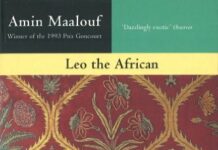
Ebook Info
- Published: 2012
- Number of pages: 309 pages
- Format: PDF
- File Size: 1.58 MB
- Authors: Amin Maalouf
Description
A gripping historical novel set in 11th century Persia that imagines the life of poet and philosopher Omar KhayyamAccused of mocking the inviolate codes of Islam, the Persian poet and sage Omar Khayyam fortuitously finds sympathy with the very man who is to judge his alleged crimes. Recognising genius, the judge decides to spare him and gives him instead a small, blank book, encouraging him to confine his thoughts to it alone.Thus begins the seamless blend of fact and fiction that is Samarkand. Vividly re-creating the history of the manuscript of the Rubaiyaat of Omar Khayyam, Amin Maalouf spans continents and centuries with breathtaking vision: the dusky exoticism of 11th-century Persia, with its poetesses and assassins; the same country’s struggles nine hundred years later, seen through the eyes of an American academic obsessed with finding the original manuscript; and the fated maiden voyage of the Titanic, whose tragedy led to the Rubaiyaat’s final resting place – all are brought to life with keen assurance by this gifted and award-winning writer.
User’s Reviews
Reviews from Amazon users which were colected at the time this book was published on the website:
⭐Maalouf takes the reader on a voyage in space and time while providing deep analyses of the Orient. It is a book that wakens your senses and is rich with meanings. Read it if you want to understand the intricacies and the psyche of the Orient. The English translation has unfortunately few typos. Otherwise the book is sublime.
⭐The story of Samarkand is woven around the history of the manuscript of the Rubaiyaat of Omar Khayyam, from its creation by the poet and sage in eleventh-century Persia to its loss when the Titanic sank in 1912. Unwittingly involved in a brawl on the streets of Samarkand, Omar Khayyam is brought before a local judge who recognizes his genius as a poet and gives him a blank book in which to inscribe his verses. Thus the head of a great poet is saved and the Rubaiyaat of Omar Khayyam is born. The threads of his life become interwoven with the designs of the vizier, Nizam al Mulk, and of Hassan Sabbah, the founder of the Order of the Assassins who later hides the precious manuscript in his famous mountain fortress. At the end of the nineteenth century the poems fire the imagination of the West in Edward Fitzgerald’s evocative translation. An American scholar learns of the manuscript’s survival and recovers it with the help of a Persian princess. Together they take it on the fateful voyage of the Titanic.
⭐Samarkand is a beautifully and skillfully told tale told between two times. The first in the time of Omar al khayyam the persian scientist, astrologist and poet, the second about the American Benjamin Omar Lesage an american journalist and adventure. Both driven by love and curiosity.As for my opinion in the novel.. I always thought that Amin maalouf portrayal of the western orientalist was most accredited in the book than the quality of the novel itself. In simple words overrated.
⭐I was very excited with the prospects of reading a good novel about Persia, especially about Omar Khayyam, but this book left me with an overall sense of disappointment. There is no doubt that Maalouf did superb research for this book and the story has its nice moments. But, I cannot agree with the rave reviews on his writing skills. I felt that he took the easy way out with all aspects of writing. Instead of trying to interlink the two stories (one is of Khayyam, the other is a modern love story/ historical adventure) with flashbacks to the time of Khayyam, for example, he wrote one story first. Then, wrote the second (book II). Even with this easy method, he didn’t do a good job. Book I mostly reads as a novel about Khayyam, but when it is convenient, he switches his tone and makes references to historical data as if it is a non-fiction book. With Book II, I thought character development was pretty lame. I never fully understood the hero’s (actually he didn’t do anything heroic in my opinion) motivation to pursue his travels. I think he was bored, rich and had nothing better to do. I also thought the author showed clear prejudice against Turks. Anyone who was Turkish was described with a negative attribute. Also, throwing in Titanic and talk about the whole disaster in the length of 3 pages was very lame. Couldn’t he come up with a better solution for the fate of the greatest Oriental book ever?
⭐This book is the current version of 1001 Nights. So many incidents and fascinating characters starting with Omar Kayaam himself. So much palace intrigue in the first half followed by politics in the second half narrated by our second Omar.
⭐As a prime member, am I wrong to say that this should be free for me as a prime member? Yhanks
⭐Amin Maalouf is a rare writer. His novels work so well not only because he writes with such beauty and clarity, but creates such wonderful stories. One can learn a great deal about the time period in which he writes, but you will find that his characters face fortune and tragedy in equal amounts. To say that he is merely cultivated is to underrepresent his sensitive and humane writing.
⭐Very good book. Entertaining as well as informative. What else does one want from a book. Recommended.Enough writing silly reviews. Just read the book!
⭐Mr. Maalouf’s fiction, whether occurring in Tisfon or Samarqand or elsewhere reminds me solidly of Frank Herbert’s “Dune” (original) in some nebulous but comforting manner. It’s not difficult to find some immediate connections between subject matters, and to suggest any similarity between authors is in honest praise of both.”Gardens of Light” by the same author is the better by half a bolt of silk, but there’s not much between them.Just superb.
⭐A truly remarkable book. In this thoroughly researched work the author displays a stunningly profound understanding of Iran and its people. Weaving fact and fiction seamlessly together the early chapters provide a fascinating and convincing insight into life in 11th century Persia. The relationship between Omar Khayyam and his contemporary Hassan-i-Sabah, the founder of the Assassins is illuminating. The last part of the book is brilliantly thought out and presented. Covering the relatively recent history of Iran in the late 18th and early 19th centuries – the period of the so-called ‘Great Game’ between the UK and the Russians – it should be on the ‘must read’ list of any journalist or politician trying to grapple with the politics and intrigues of modern day Iran.
⭐A great little novel! Maalouf has a playful surreal style that just fits this period of history so well. The prose mixes historical accounts with an interesting fictionalised narrative of real people. That said, I must say that the latter sections of the book failed to grip me as much as the first ones did.
⭐I have to start this review by saying that Samarkand as a novel is fantastic and well worth purchasing. However. DO NOT buy it from this publisher, I have now had two copies of this book provided, one of which started at chapter 47 and missed out chapters later on, the second, replacement, just stopped abruptly and didn’t even include the last chapters. I’ve never known a publisher to fail with quite this frequency.In conclusion DO BUY the book, avoid this version.
⭐An excellent read for any lover of Omar Khayyam verse. The book also gives a good look into certain aspects of Persian and Islamic complexities in the 11th and 12th centuries with the establishment of the Assassin cult.The tongue in cheek narrative by the “author”( not Amin) about the original Khayyam document and his search and subsequent privileged viewing of it is an entertaining way of avoiding a dry historical script.
Keywords
Free Download Samarkand in PDF format
Samarkand PDF Free Download
Download Samarkand 2012 PDF Free
Samarkand 2012 PDF Free Download
Download Samarkand PDF
Free Download Ebook Samarkand

